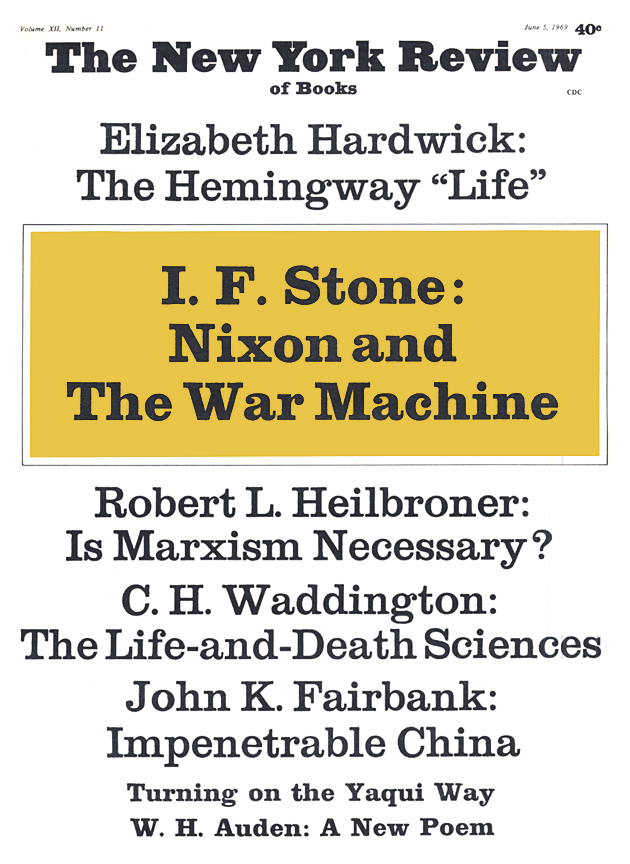In response to:
At King Lyndon's Court from the April 10, 1969 issue
To the Editors:
May I raise a fine point about Murray Kempton’s exemplary review of Eric Goldman’s view from belowstairs of LBJ at home and at work [NYR, April 10]?
I’m grateful that Mr. Kempton should find inherently incredible, even without Saul Bellow’s testimony, that preposterous line that Goldman composed for me (“We made you and we can break you”—a line never actually uttered by anyone living or dead, with the possible exception of early George Raft); but I wish that, while he was about it, he had pressed Bellow further so that the charge of “turncoat” might also be struck from the record, for that, too, is an utterance I not merely did not make but could never have made, whatever the provocation, it being another of those words I simply cannot bring myself to use. It’s rather a funny word, if you look at it closely; I myself, at such a moment of extreme feeling, usually make do with an obscenity, often in Yiddish. Since I’m speaking for the record now, I thought Goldman should know this.
But why should Mr. Kempton suppose that “this is not a story anyone could have believed”? This is to imagine that all readers are as skillful and generous as he, whereas few in fact are. After all, did not a reputable historian write that I said so? Wasn’t the book an expensive and therefore an authoritative one—published by a reputable house? Doesn’t the statement—no mere paraphrase, no surmise—bear the ultimate sanction of quotation marks—as if I had first summoned Goldman and his tape recorder because, by God, I wanted all the world to know that my henchmen and I had made Bellow what he is today and my henchmen and I could break him like a matchstick? No one who knows me will believe it; and some who, like Mr. Kempton, do not know me will not believe it either, for no better reason than that it rings false, that it is bad art; but most people do not know me and are only too happy to believe that that’s the way things really are behind the scenes, and in the sewers of New York where these deals are made.
And, finally, having disposed of all utterances directly attributed to me, why should Mr. Kempton accept on its face Bellow’s charge that I “said a number of pompous things that afternoon” of our historically trivial encounter in the White House, and conclude from this that I spoke to Bellow as a “moral snob”? I’ve described that abrupt conversation in the columns of Harper’s Magazine, where Goldman’s self-serving account of the White House Festival of the Arts first appeared; and there’s no need to repeat the melancholy details here. Except to say this. While I’m as prone to pomposity as the next man, I was if anything too diffident on that occasion. Nothing less than the war in Vietnam was at issue. I said what scarcely needed saying, that I supported the sentiments expressed in Robert Lowell’s telegram, and this, of course, was taken as a rebuke. If that is snobbishness, then we are all snobs. But I said nothing else, and when I realized how distressed Bellow was, I backed off entirely, for the reason, precisely, that I didn’t want to add to his distress. I certainly never asked him how he could “stand up there and read from your books after what that man has done in Vietnam?,” or anything remotely like it—though it is a question I might have asked, if never in that way, on another, less-charged occasion. I had considered saying “Hi, there” when we chanced to meet (a meeting I had, in fact, hoped to avoid) and going on from there to ask whether he’d read any good novels lately; but news from the front was bad, it was getting late, and none of us had much heart left for anything but dinner. None of us save Goldman, who still had a lot to do. Like dub voices, and splice tapes.
Saul Maloff
Bridgewater, Connecticut
This Issue
June 5, 1969


